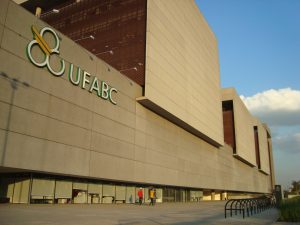Equipe de Coordenação
Coordinador: Prof. Dr. Rodrigo de Freitas Bueno
Vice-coordinador: Prof. Dr. Ricardo Hideo Taniwaki
Representantes Docentes:
Maria C. Valverde Brambila / Lúcia Helena Gomes Coelho
Vitor Vieira Vasconcelos / Victor Fernandes Nascimento
Tatiane Araújo de Jesus / Roseli Frederigi Benassi
Representantes Discentes: Débora Freitas / Mariana Fialho
Postgraduate program description
The Master’s course in Environmental Science and Technology aims to:
- Promote the development of environmental research, science and technology and promote the training of human resources in the areas of environmental science and technology, based on interdisciplinary research.
- Contribute to the construction of knowledge in environmental science, looking for a better understanding of (i) the elements that structure the Earth system and other natural systems, (ii) factors that establish the balance between its components, (iii) their variations in time and space, natural origin and arising from anthropogenic actions, and (iv) an understanding of the dynamics of natural processes and the consequences of anthropic interference.
- Scientific advancement of environmental science and technology, in an interdisciplinary way, for the development of systems and new technologies for sanitation and environmental monitoring, production of new materials and energy sources, as well as seeking the improvement of existing technologies applied to the mitigation of environmental problems.
- The training of master students capable of solving complex problems, specific to the environmental area, which will require a continuous dialogue between different areas of knowledge or an interdisciplinary approach.
The trained master students should be able to work in public or private companies or institutions, to deepen the research already developed, and/or to develop new scientific knowledge, to discuss pertinent themes, especially in the analysis of environmental systems, their natural and anthropogenic variations, as well as how to develop and apply established technologies or develop new technologies for the prevention, solution and mitigation of environmental problems.
RESEARCH AREAS
The graduate program has a concentration area, which is its central thematic focus, with environmental science promoting support for the development and application of technologies for the prevention, solution, and mitigation of environmental problems, through the generation of knowledge about the functionality and dynamics of the systems and the consequences resulting from anthropogenic interferences. This area of concentration is supported by two lines of research: Environmental Systems, which proposes to gather and generate scientific knowledge about different environments, interpretation of its natural and anthropic dynamics, and, to subsidize the development of technologies to solve problems; and Environmental Technologies, whose purpose is to develop technologies that promote conservation and environmental recovery.
Environmental Systems
This line of research refers to the characterization of natural environments in terms of their structure and functioning, in space and time, identification of their conditioning factors, and understanding the dynamics of natural processes and the consequences of anthropic interference. This characterization will make it possible to understand the functioning of the systems, including their limits of resistance and resilience, which will support the techniques of maintenance and recovery of their properties. Among the expected approaches, we give special attention to i) the characterization of natural environments; ii) identification of environmental changes caused by human actions (e.g. burning, deforestation, pollution, and changes in land use); iii) environmental monitoring strategies; iv) analysis of the pollutant dispersion dynamics; v) the study of climatic variations and changes, related to human and natural effects, and their impacts.
Environmental Technologies
This research line refers to the use of established technologies and, based on scientific advances, to the development and improvement of new technologies applied to natural systems, for conservation purposes. For artificial systems, the research line aims to mitigate environmental impacts or recovering degraded areas. Based on the information on the characteristics of natural and modified systems, this research line aims to use or develop techniques that prevent, mitigate or recover degraded environments based on their characteristic properties. We give special attention to i) the prevention and treatment of water, effluents, and waste; ii) environmental monitoring aiming at the recovery of degraded areas; iii) recovery of degraded areas; iv) the development of processes and materials of low environmental impact (e.g. recycling of materials, production of biodegradable materials); and v) sustainability.

